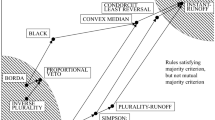Summary
This article deals with some aspects of the problems raised by the use of a specific majority rule as a mechanism of decision-making, viz. (i) given some particular preference-patterns of the individual voters, the result of the voting, i.e. the “social” ordering of the available alternatives, lacks the property of transitivity; (2) the intensities of the preferences of the different groups of voters will not be taken into consideration by a simple majority rule as long as the possibility of a voter's strategy and of logrolling are excluded.
The most important question to be answered is to which degree these objections against the use of the majority rule are overcome by introducing the possibility of (explicit) logrolling. An attempt is also made to answer the question if, from the point of view of welfare economics the result of voting after logrolling is superior to the result of voting without logrolling.
To simplify the analysis the voters are supposed to be “rational beings”; all normative aspects of their attitude towards the result of the voting procedure or towards the decision-rule itself are eliminated.
The analysis shows that the process of negotiations, meant to result in a majority-transaction for a number of winning alternatives will in many instances take a circular course, i.e. it does not, in the game-theoretic sense, produce a stable solution. If one applies the Paretian criterion for an increase in social welfare, a statement concerning the welfare aspect of logrolling is shown to be possible only in a very limited number of situations.
In some cases logrolling provides a solution for the problem of intransitivity. A welfare judgment about this solution is not possible.
Finally a paper on logrolling by J. S. Coleman is commented upon.
Similar content being viewed by others
Rights and permissions
About this article
Cite this article
In't Veld, R.J. Stemmenhandel. De Economist 117, 24–72 (1969). https://doi.org/10.1007/BF01726048
Issue Date:
DOI: https://doi.org/10.1007/BF01726048




